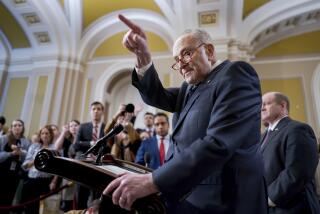Trade-tied jobless aid gets push
WASHINGTON — Ted Ludwig had 12 years on the job as a Northwest Airlines mechanic in 2001 when the company started moving production from his suburban Minneapolis plant to Asia and began laying off workers. The former Air Force mechanic and father of two held on for an additional four years before losing his job.
Then he applied for trade adjustment assistance, a federal program that offers extended unemployment benefits, healthcare and training subsidies to manufacturing workers and farmers displaced by international trade. But Labor Department investigators told Ludwig that he and the rest of his union members didn’t qualify because they were service workers.
“The argument was, ‘You don’t really have a manufacturing job, it’s just that they outsourced your job,’ ” Ludwig, 44, said. “Well, we took apart aircraft down to nuts and bolts. It’s as close to manufacturing as you can get without being on an assembly line.”
After Ludwig approached Sen. Norm Coleman, the Minnesota Republican proposed legislation last month with Sen. Max Baucus (D-Mont.) that would expand trade adjustment assistance to service workers.
“We have an obligation to ensure American workers displaced by evolving international competition receive the training they need for new, better-paying jobs, and access to quality healthcare,” Coleman said in a statement Friday.
Advocates for expanding the program say its eligibility requirements are too narrow, eliminating many of the U.S. workers hit hardest by international competition. About a quarter of workers who apply are rejected, according to a forthcoming study by the Washington-based Trade Adjustment Assistance Coalition, which Baucus advises.
With the president’s trade promotion authority known as fast track expiring at the end of June, leaders in the Democratic majority say they plan to seek expanded trade adjustment assistance as a condition for reauthorizing fast track.
“We need to look at new and innovative ways to help workers compete in the global market,” said Brendan Daly, a spokesman for House Speaker Nancy Pelosi (D-San Francisco). “It’s clear that much more needs to be done to help displaced workers and local communities overcome the challenges that arise when jobs move offshore.”
White House economists and Republican congressional leaders say fast track is necessary for nailing down trade pacts with Colombia, Peru, Panama and South Korea, as well as the ongoing Doha round of trade talks. Congress first granted President Bush fast track in 2002.
But Democrats in Congress say fast track should not continue without more protections for American workers.
“It just makes good business sense to do this,” said Rep. Xavier Becerra (D-Los Angeles). “We’re talking about keeping American industry alive and workers productive.” Becerra pushed to expand the Labor Department’s trade adjustment program in 1997 as part of negotiations for the North American Free Trade Agreement and co-sponsored legislation to expand it again last year.
Becerra said California truckers, light manufacturing and garment workers have been displaced by trade and deserve a bigger share of trade adjustment assistance.
“Just walk through the garment district in L.A.,” he said. “While it’s still vibrant, and you can walk through many blocks where there are fabrics that are manufactured and sewn locally, it’s a dying, shrinking industry” due to competition from Asia.
Aircraft mechanic Leonard “Lenny” Cipressi, 56, of Valencia was president of his union local in Los Angeles when airlines laid off about 200 of his local’s members in 2005. He applied for trade adjustment assistance on their behalf and was denied for the same reason Ludwig was.
He said mechanics were among those who would benefit most from short-term retraining because they’re already versatile, skilled in hydraulics, mechanics and welding.
“If the government is going to help anybody with a program like that, it should be everybody” affected by trade, Cipressi said. “It shouldn’t just be one demographic or a particular industry.”
Trade adjustment assistance has an $837-million budget and is set to expire in September. About 120,000 workers participate nationally, 11,935 of them in California, including about 3,300 in Los Angeles County. Participants receive two extra years of unemployment benefits, two years worth of subsidies for full-time training, such as community college classes, and covers 65% of their healthcare premiums during that time.
Gary Mosey applied for trade adjustment assistance and was rejected several times during the last three years. Mosey, 50, first applied in 2004 after he was laid off with 19 others from his job designing auto parts at a Detroit-area manufacturing plant that shifted production to India.
A high school graduate without a college degree, Mosey struggled to find work, as did his former co-workers. In July, one 61-year-old man who was on the verge of losing his home attempted to rob a bank.
“I felt pretty incensed,” Mosey said of the process. “We knew why we were losing our jobs. I just didn’t like the denial.”
Baucus, who chairs the Senate Finance Committee, proposed legislation with Coleman that allows the Labor Department to certify whole industries as eligible, such as auto manufacturing, open the program up to service workers and increase health insurance and unemployment benefits. The legislation would also lower the qualifying age to 40 from 50 for wage insurance. An alternative form of trade adjustment assistance, the wage insurance offers workers making less than $50,000 a year at their new jobs as much as 50% of the difference between their old and new salaries, or as much as $10,000.
Economists say the proposal could triple the program’s size and cost. A Baucus spokeswoman said the senator and his staff were still investigating funding sources.
Most of the resistance to expanding trade adjustment assistance will probably come from free-trade advocates, mainly Republicans, who don’t want to see trade blamed for putting Americans out of work.
Rep. Jim McCrery (R-La.), a free-trade advocate and the ranking Republican on the House Ways and Means Committee, opposes expanding trade adjustment assistance, which he said should be redesigned as “global adjustment assistance” for workers displaced by globalization and technology.
Bush has praised trade adjustment assistance, most recently during his “state of the economy” speech in January, as a way for blue-collar workers to stay competitive in the global economy. But his 2008 budget cut the program’s training allowance by $23 million, and cut funding for training under the Workforce Investment Act, the other major federally subsidized program for displaced workers, by 24%, or $7,000 a worker.
White House Deputy Press Secretary Tony Fratto called fast track vital to the U.S. economy, and said the president supported expanding trade adjustment assistance too, as long as it’s “effective in terms of helping workers find the employment that they desire, find the skills that make them marketable.”
Some Republican leaders are willing to consider expanding assistance if it guarantees Democrats will approve fast track, including Baucus’ longtime colleague and former Finance Committee chairman, Sen. Charles E. Grassley (R-Iowa).
“It’s not a new idea to combine them and reauthorize them both at once,” Grassley said in a statement. “I’m open to that possibility this time.”
molly.hennessy-fiske@latimes.com
More to Read
Get the L.A. Times Politics newsletter
Deeply reported insights into legislation, politics and policy from Sacramento, Washington and beyond. In your inbox three times per week.
You may occasionally receive promotional content from the Los Angeles Times.











